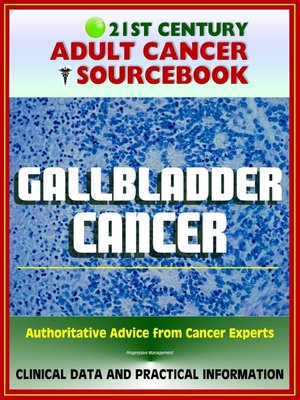21st Century Adult Cancer Sourcebook
ebook ∣ Gallbladder Cancer--Clinical Data for Patients, Families, and Physicians
By Progressive Management

Sign up to save your library
With an OverDrive account, you can save your favorite libraries for at-a-glance information about availability. Find out more about OverDrive accounts.
Find this title in Libby, the library reading app by OverDrive.



Search for a digital library with this title
Title found at these libraries:
| Loading... |
Authoritative information and practical advice from the nation's cancer experts about gallbladder cancer includes official medical data on signs, symptoms, early detection, diagnostic testing, risk factors and prevention, treatment options, surgery, radiation, drugs, chemotherapy, staging, biology, prognosis, and survival, with a complete glossary of technical medical terms and current references. Special topics covered include ERCP, PTC, and laparoscopy.
Starting with the basics, and advancing to detailed patient-oriented and physician-quality information, this comprehensive in-depth compilation gives empowered patients, families, caregivers, nurses, and physicians the knowledge they need to understand the diagnosis and treatment of gallbladder cancer.
Comprehensive data on clinical trials related to gallbladder cancer is included - - with information on intervention, sponsor, gender, age group, trial phase, number of enrolled patients, funding source, study type, study design, NCT identification number and other IDs, first received date, start date, completion date, primary completion date, last updated date, last verified date, associated acronym, and outcome measures.
Gallbladder cancer is a rare disease in which malignant (cancer) cells are found in the tissues of the gallbladder. The gallbladder is a pear-shaped organ that lies just under the liver in the upper abdomen. The gallbladder stores bile, a fluid made by the liver to digest fat. When food is being broken down in the stomach and intestines, bile is released from the gallbladder through a tube called the common bile duct, which connects the gallbladder and liver to the first part of the small intestine. Being female can increase the risk of developing gallbladder cancer. Anything that increases your chance of getting a disease is called a risk factor. Risk factors for gallbladder cancer include being female and being Native American. Possible signs of gallbladder cancer include jaundice, pain, and fever. These and other symptoms may be caused by gallbladder cancer. Other conditions may cause the same symptoms. A doctor should be consulted if any of the following problems occur: jaundice (yellowing of the skin and whites of the eyes); pain above the stomach; fever; nausea and vomiting; bloating; lumps in the abdomen. Gallbladder cancer is difficult to detect (find) and diagnose early.
Extensive supplements, with chapters gathered from our Cancer Toolkit series and other reports, cover a broad range of cancer topics useful to cancer patients. This edition includes our exclusive Guide to Leading Medical Websites with updated links to 81 of the best sites for medical information, which let you quickly check for updates from the government and the best commercial portals, news sites, reference/textbook/non-commercial portals, and health organizations. Supplemental coverage includes:
Levels of Evidence for Cancer Treatment Studies
Glossary of Clinical Trial Terms
Clinical Trials Background Information and In-Depth Program
Clinical Trials at NIH
How To Find A Cancer Treatment Trial: A Ten-Step Guide
Taking Part in Cancer Treatment Research Studies
Access to Investigational Drugs
Clinical Trials Conducted by the National Cancer Institute's Center for Cancer Research at the National Institutes of Health Clinical Center
Taking Time: Support for People with Cancer
Facing Forward - Life After Cancer Treatment
Chemotherapy and You






